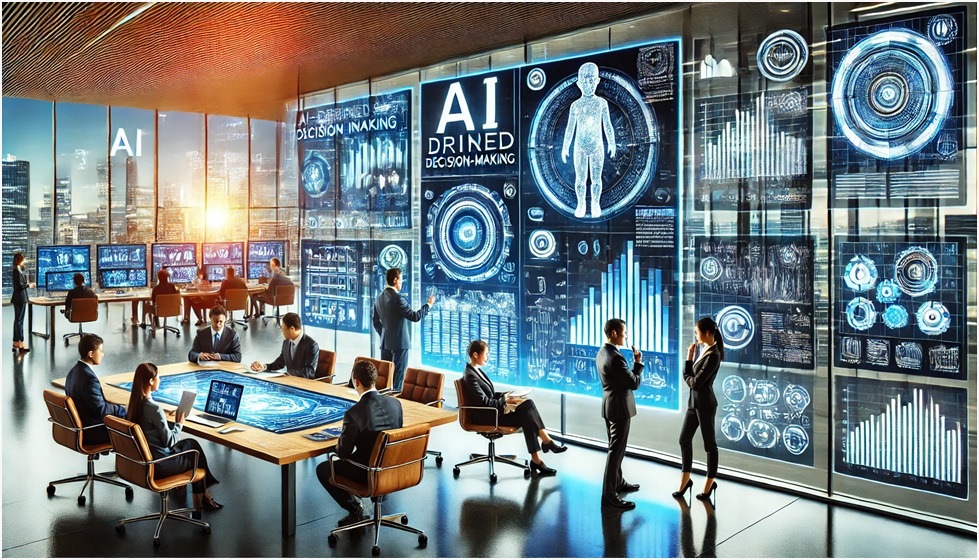Artificial Intelligence (AI) has transitioned from being a futuristic concept to a fundamental tool for businesses worldwide. It empowers organizations to make smarter, data-driven decisions by analyzing vast amounts of information, identifying patterns, and providing actionable insights. This blog explores how AI is reshaping business decision-making across various sectors, enhancing efficiency, accuracy, and innovation.
1. Data Analysis and Insights
AI excels in processing and analyzing large datasets, uncovering trends and insights that would otherwise go unnoticed.
Applications:
- Customer Behavior Analysis: AI tools like Google Analytics help businesses understand customer preferences and behavior.
- Market Trends Prediction: Machine learning models predict market dynamics, helping businesses stay ahead of competitors.
Example: Netflix uses AI to analyze user viewing habits, offering personalized recommendations and deciding future content investments.
2. Enhancing Operational Efficiency
AI-driven automation streamlines operations, reducing costs and improving productivity.
Key Areas:
- Inventory Management: AI optimizes stock levels by predicting demand.
- Supply Chain Optimization: Predictive analytics reduce delays and optimize logistics.
Example: Amazon’s AI-powered logistics network ensures efficient delivery and inventory management.
3. Personalizing Customer Experiences
AI allows businesses to offer tailored experiences, fostering customer loyalty and satisfaction.
Techniques:
- Chatbots: AI-powered assistants like Zendesk provide instant customer support.
- Recommendation Engines: Suggest products or services based on user preferences.
Example: Spotify uses AI to curate personalized playlists, enhancing user engagement.
4. Risk Management
AI helps businesses identify and mitigate risks, ensuring smoother operations.
Features:
- Fraud Detection: AI models detect unusual patterns in financial transactions.
- Predictive Maintenance: Monitors equipment health to prevent breakdowns.
Example: Mastercard uses AI to identify fraudulent activities in real time, saving millions in potential losses.
5. Optimizing Marketing Strategies
AI revolutionizes marketing by targeting the right audience with the right message at the right time.
Tools:
- Predictive Analytics: Forecasts campaign performance and customer behavior.
- Natural Language Processing (NLP): Analyzes customer sentiment on social media.
Example: Coca-Cola uses AI to analyze social media trends, crafting campaigns that resonate with audiences.
6. Improving Decision Accuracy
AI minimizes human biases, leading to more accurate and objective decision-making.
Applications:
- Employee Hiring: AI tools screen resumes and suggest candidates based on skill match.
- Investment Decisions: Financial firms use AI to analyze market data and make informed investment choices.
Example: JPMorgan Chase leverages AI to evaluate investment opportunities, reducing risks.
Challenges in AI-Driven Decision Making
- Data Quality: Poor-quality data leads to inaccurate predictions.
- Bias in Algorithms: Training models on biased datasets can perpetuate inequalities.
- Ethical Concerns: Balancing automation with human oversight is crucial.
The Future of AI in Business
The role of AI in business decision-making will expand further with advancements in technology:
- Explainable AI: Models that explain their decisions will enhance trust.
- AI-Powered Creativity: Tools generating ideas for marketing and product design.
- Decentralized AI: More secure and efficient decision-making systems.
Conclusion
AI is transforming business decision-making by enabling faster, more accurate, and data-driven choices. While challenges remain, organizations that effectively integrate AI into their workflows will gain a competitive edge in an increasingly digital world. By embracing AI, businesses can not only improve their decision-making processes but also drive innovation and growth.








